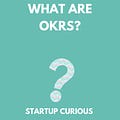Hello and welcome back to Startup Curious, where we discuss things you should know if you’re thinking about working for or starting a startup.
On our last episode, we went over some general tips around setting goals. Today, I want to discuss a specific goal setting methodology that many startups use - OKRs.
OKR stands for “objectives and key results.” The idea is that you don’t just set a goal (or objective), you also take the time to figure out what metrics (or key results) need to be achieved in order to accomplish that goal. It was originally used at Intel in the 70s and then ended up spreading to startup culture in the 80s.
One interesting thing about OKRs is that the objectives don’t need to be quantifiable - just the key results. So you may have an objective like “Make our customers the happiest in the industry” with key results like “Average hold time for our customer support number under 10 minutes” and “Average satisfaction survey score of 9/10.” This adds to the appeal somewhat, because you can have some fun thinking of interesting and engaging objectives… before getting to the harder work of figuring out how exactly you would know if you had achieved them.
Another important aspect of OKRs is designating who is responsible for achievement. At a larger company, this is usually done by team, though at a smaller company it may be down to individuals. In general, OKRs tend to be top down - the top leadership at an organization will designate some company wide objectives, which they will share with their teams.
The teams will then come up with key results to support those company wide objectives, and may also come up with some smaller objectives that are more specific to their team (or that can be achieved while collaborating with one or two other teams across the organization).
Overall, the key thing here is communication and transparency. The leadership shouldn’t just create objectives and throw them over the fence. There should be clear communication across the entire organization around why those objectives are so important for the company, what expectations the leadership has around achieving them, etc. At a smaller company, these conversations may only take a few hours. At a larger organization, as you can imagine, it could take much longer.
Of course, as with all goal setting, the framework doesn’t really make or break whether your team achieves what they’re setting out to achieve. It’s more of a way to provide a common language that everyone across the organization can understand, so that they all know which direction they’re supposed to be headed in.
Unfortunately, founders sometimes feel pressured to follow a certain framework or methodology to the letter. It’s almost like a superstition - if I follow these exact steps, success is guaranteed... but it doesn’t really work like that. If whatever framework you’re trying to use doesn’t seem to be working for your team… modify it! Your job as a leader is to figure out what works best for your people, not force your people into some kind of framework shaped box.
Okay, and with that tangent, we’ll wrap up for today. Thank you for joining us! If you found this episode useful, please remember to subscribe and share. Our goal is to make startups more approachable for everyone and the only way we can do that is to get the word out!
Suggestions
If you have a topic you’d like to learn more about, or you’re a founder who would like their story featured on this show, send me an email at v@thescrappyoperator.com.














What are OKRs?